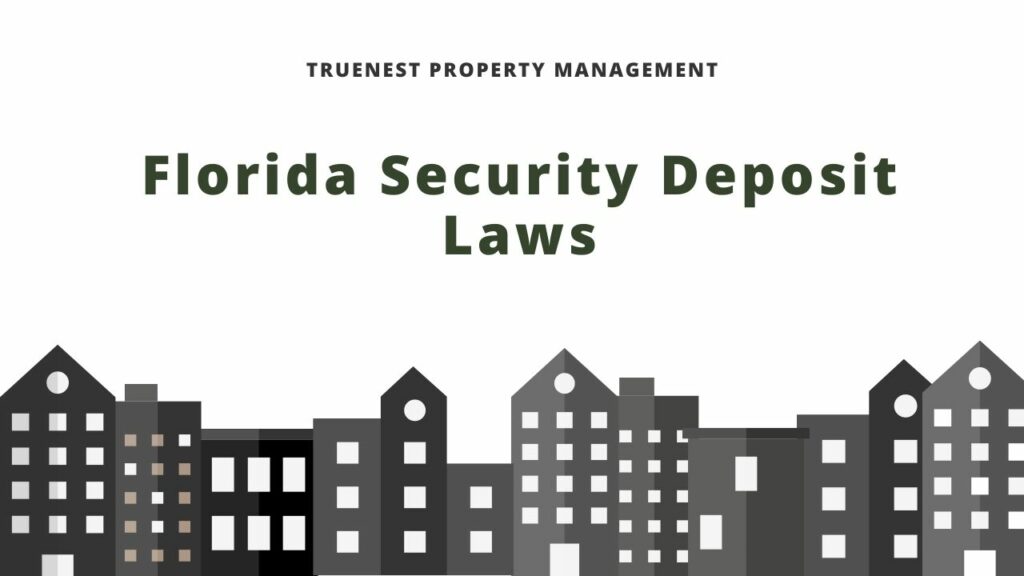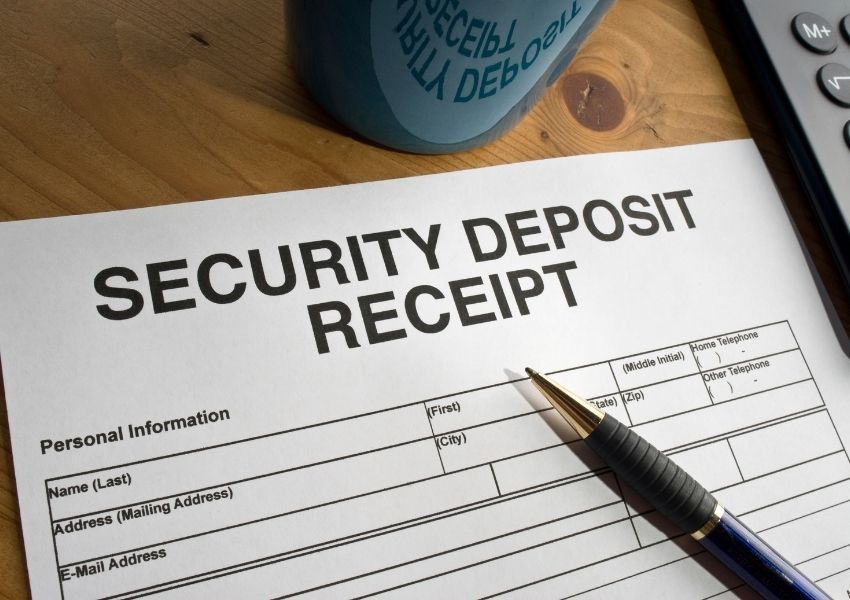Florida Security Deposit Laws

No Florida landlord-tenant law compels landlords to charge a tenant’s security deposit. But Florida landlords charge it, as it ensures they are compensated, at least in part, for any potential losses that the tenant causes, such as negligent damage and unpaid rent regarding their rental property. Additionally, if the tenant breaks this agreement, they may be liable.
Even though there are no laws that compel a landlord to charge a tenant’s security deposit. But there are rules that landlords must abide by if they choose to charge their tenants this security deposit in Florida.
TrueNest Property Management has put this article together to help any Florida landlord understand their rights and responsibilities as per the Florida Security Deposit law:
Is There a Security Deposit Limit?
No, there is no limit as to how much security deposit a Florida landlord can charge.
Can Florida Landlords Charge a Pet Deposit?
Absolutely, landlords in Florida can charge an additional pet deposit on top of any security deposits, if they desire. This pet deposit can be put towards resolving any damage caused specifically by a pet.
Landlords cannot ask for an additional pet deposit from tenants who have service animals. So, by requiring a disabled tenant to pay extra for their service animal you would be violating the Fair Housing Acts and leave you susceptible to legal action based on how the Fair Housing Act protects service animals.

How Should You Store a Security Deposit?
As a landlord in Florida, you have three options when it comes to storing your tenant’s security deposit.
Non-Interest-Bearing Account
The account must be in a bank located within the state of Florida. Additionally, landlords are not allowed to commingle the deposit with other funds.
Interest-Bearing Account
You can also choose to store your tenant’s deposit in an account that gives interest. But the account must be in a Florida bank as per security deposit law.
You’ll have two options when it comes to giving the tenant the interest earned:
- Credit the tenant with 75% of the interest earned from the interest-bearing bank account.
- Give the tenant 5% simple interest rate per year on the deposit amount.
You have also been prohibited from commingling the deposit in this account with other security deposits. If the landlord fails to do so,
Security Bond
You can also choose to post a security bond or surety bond from a surety company. The company must be licensed by the clerk of the circuit court in the county your unit is in. Additionally, you must pay your tenant a simple annual interest of 5% on the deposit amount.
The surety bond you post must be for a security deposit, or $50,000, whichever is less.
Do You Need to Give a Security Deposit Receipt?
Yes, tenants in Florida have the right to an initial written notice after the landlord receives their deposit. This receipt must be sent within 30 days after receiving their security deposit. The notice must also include the following information:
- The name and address of the banking facility where you’ve stored their deposit in.
- Whether you’re keeping the funds separate or commingling them with other funds.
- The rate of interest at which the tenant’s deposit is being held (if you’re storing the funds in an interest-bearing account).
You should deliver the notice either in person or through certified mail.

Can A Landlord Make Deductions to the Security Deposit?
Under the Florida landlord-tenant law and the Florida security deposit laws, you’re allowed to make deductions once the lease term is complete, for the following reasons:
- To recover unpaid rent.
- To resolve any monetary damage that results from the tenant’s breach of the lease.
- Any other allowable charges under the lease agreement, such as an early termination fee.
- Cost of repairing property damage exceeding normal wear and tear.
If a tenant objects to any of these deductions they can
Can a Tenant use the Security Deposit as the Last Month’s Rent?
If there is a written agreement between you and your tenant saying so, then yes. Otherwise, a tenant would be in violation of the agreement under, Florida’s security deposit law, if they choose to use the security deposit as rent without your consent.
When Should You Return Your Tenant’s Security Deposit?
In Florida, landlords have exactly 15 days from the time their tenant leaves to return their security deposit. landlords must also include any interest accrued alongside the tenant’s security deposit.
If there are deductions, then you have 30 days, as per Florida statute, to let the tenant know of your intentions to withhold a portion of the deposit. Landlords must include certain information in the written notice. Such as:
- The reason for withholding a portion or all your tenant’s security deposits.
- You must inform your tenant that they have a right to contest the deductions. However, if they choose to, then they must do so within 15 days.
- This notice must be sent by mail to the tenant’s last known address. It’s your tenant’s responsibility to provide you with a forwarding address.
If your tenant doesn’t contest the deductions, then you have 30 days to send them the remaining portion of the security deposit.

What Happens If You Sell the Rental Property During a Tenancy?
You must transfer the tenant’s deposit (or whatever remains of it) and any interest accrued to the new owner and inform the tenant.
Bottom Line
Florida landlords may not be required to charge a security deposit. But it is in their best interests to do so and if they do, they should understand how Florida laws govern the storage, management, and returns of this security deposit.
If you have any questions regarding Florida security deposit laws, the Florida eviction process, or anything else related to property ownership, it’s always good to contact a Florida property management company. So, please don’t hesitate to contact TrueNest Property Management.
Disclaimer: This blog isn’t a substitute for professional legal advice. Laws do change and this information may not be updated at the time you read it. If you have a specific question, kindly get in touch with a qualified attorney or an experienced property management company.
